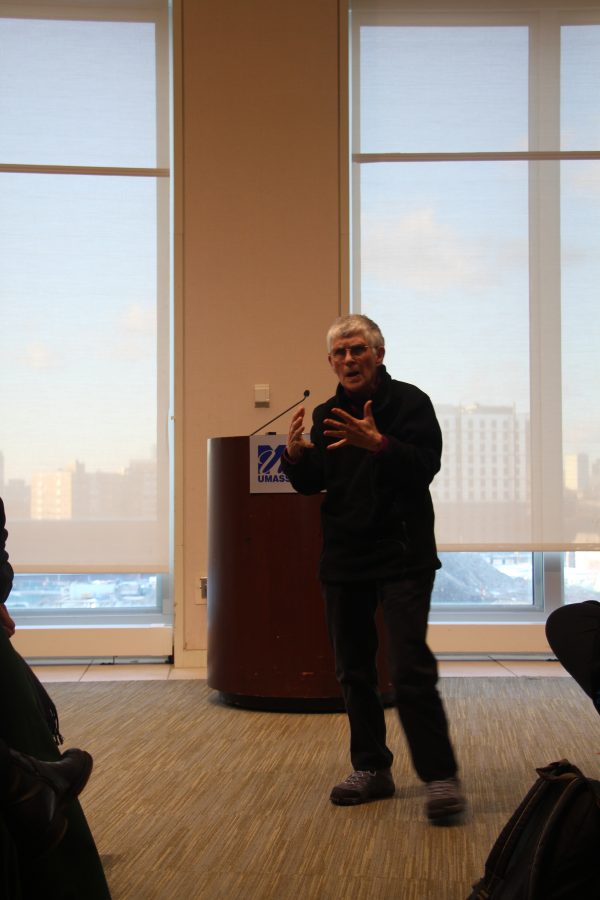Feminism theorist and writer Cynthia Enloe visited the University of Massachusetts Boston on Feb. 8, warning over 100 people who attended her seminar that the public needs to open their minds to women’s vulnerabilities when it comes to sexual harassment: “If you are vulnerable, you are the target of a harasser,” Enloe said to her audience.
Noting the #MeToo movement, Enloe claimed that the experiences of women who have been sexually harassed by Harvey Weinstein and the experiences of women who live in war zones in third-world countries like Rwanda are related: “Take the ‘Me Too’ phenomenon where so many women and some men… have spoken about sexual harassment in a lot of different work places,” Enloe said. “Take our thinking about sexual harassment in so many different kinds of work places and then ask ourselves, what does this have to do about international politics?”
Students, faculty, staff, and scholars from UMass Boston, Wheelock, Simmons College, and Clark University attended the event. In attendance was Denise Horn from Simmons and Sandy McEvoy from Wheelock.
Following the #MeToo movement, with more women coming forward with their stories of sexual harassment, it seems that the UMass Boston administration has also expressed concern. Nearly an hour after Enloe’s speaker series event, a memo was released by UMass Boston’s Vice Chancellor of the Office of Diversity, Equity, and Inclusion, Georgianna Melendez. The memo notified the UMass Boston community that sexual harassment should be recognized, and that those who have experienced it should be encouraged to come forward. The memo said the following of the university’s stance: “Our policy on sexual harassment is clear and explicit: Sexual harassment in any form is unacceptable and will not be tolerated.”
Some resources for those who have experienced sexual harassment were provided in the memo. A few of those resources included Melendez herself, University Health Services as a confidential resource for on-campus students, and Guidance Resources as a confidential resource for employees. According to the memo, members of the UMass Boston community receiving complaints of sexual misconduct must be obligated to report complaints to a supervisor on campus or a Title IX coordinator like Melendez. “We urge everyone to speak up and tell someone if you or someone you know has experienced unwelcome and unwanted behavior,” the memo stated.
When Enloe asked the audience to raise their hands if they had ever felt like they were in a toxic work environment, several hands went up. Enloe explained that women who have experienced sexual harassment were afraid they would be stigmatized if they spoke out.
Many UMass Boston students who attended Enloe’s event were encouraged by professors to go for extra credit, including senior student Luzvinda Melo who came for her Gender, Development, and Globalization class with Professor Nada Ali.
“I thought it was really informative,” Melo told The Mass Media.
Despite her skepticism, Enloe said that the #MeToo movement has been a profound “tipping point” in the history of women’s rights, and that it is hard to imagine things ever going back to the same way again.
Enloe is the author of more than 15 books, including “The Big Push” and “The Curious Feminist.” She is currently a research professor at the Department of International Development, Community, and Environment at Clark University in Worcester, MA.
The event was sponsored by various departments, including UMass Boston’s Department of Women, Gender, and Sexual Studies, Political Science, and the Global Governance and Human Security PhD program.
The Public Needs to Open Their Minds, Says Cynthia Enloe
February 8, 2018

